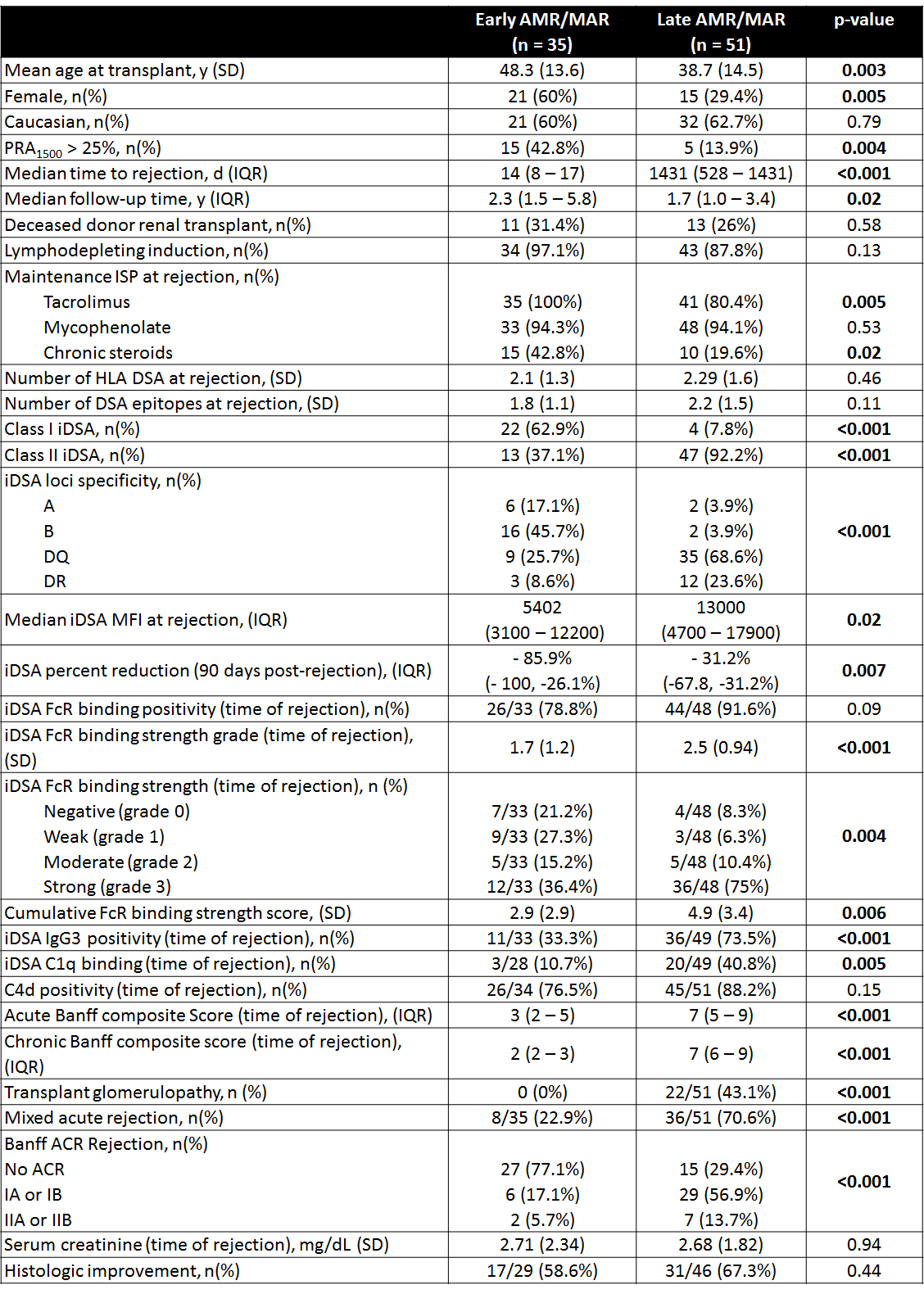Early and Late Antibody Mediated Rejection and Mixed Acute Rejection Are Clinically Distinct and Demonstrate Biologic Differences in Immunodominant Donor Specific Antibody Characteristics.
1U of Cincinnati, Cincinnati
2The Christ Hospital, Cincinnati
Meeting: 2017 American Transplant Congress
Abstract number: 402
Keywords: Antibodies, Rejection
Session Information
Session Name: Concurrent Session: Diagnosis of Antibody Mediated Rejection in Kidney Transplant Recipients
Session Type: Concurrent Session
Date: Tuesday, May 2, 2017
Session Time: 2:30pm-4:00pm
 Presentation Time: 3:30pm-3:42pm
Presentation Time: 3:30pm-3:42pm
Location: E354a
Early and late antibody mediated rejection (AMR) and mixed acute rejection (MAR) possibly result from fundamentally different immunologic processes. DSA mediates direct injury by complement-dependent and independent mechanisms. FcR binding capacity and IgG isotypes may provide complementary information regarding the pathogenic potential of DSA. Herein, we compare immunodominant DSA (iDSA) functional capacity and comprehensive clinical outcomes following proteasome inhibitor (PI) based treatment in patients with early and late AMR/MAR.
Methods: Patients experiencing AMR or MAR from 1/2005 – 08/2015 treated with a PI-based regimen were assessed. Banff Criteria were used to diagnose AMR and acute cellular rejection (ACR). MAR was defined as having both ACR and AMR. Early rejection occurred < 6 months post-RTx. Single antigen bead (SAB) assays, C1q assay, IgG isotype-specific SAB assays (IgG1, IgG2, IgG3, IgG4), and FcR binding assays were performed per standard SOPs for the laboratory developed test. Clinical and iDSA outcomes were compared between early and late AMR/MAR and pre- and post-treatment.
Results: 86 patients were included (early AMR/MAR=35; late AMR/MAR=51). Results presented below in Table 1 and Figure 1.
Conclusions:
1)Late AMR/MAR iDSA have proportionately more IgG3 positivity, stronger FcR binding, and C1q positivity versus early AMR/MAR
2)Late AMR/MAR has worse DCGS compared to early AMR/MAR
3)PI-based therapy reduced IgG3 iDSA and FcR binding strength in both early and late AMR/MAR
4)DCGS was influenced by rejection type, iDSA specificity, and iDSA reduction with PI-based therapy

CITATION INFORMATION: Lichvar A, Portwood E, Brailey P, Tremblay S, Shields A, Govil A, Cardi M, Cuffy M, Alloway R, Girnita A, Woodle E. Early and Late Antibody Mediated Rejection and Mixed Acute Rejection Are Clinically Distinct and Demonstrate Biologic Differences in Immunodominant Donor Specific Antibody Characteristics. Am J Transplant. 2017;17 (suppl 3).
To cite this abstract in AMA style:
Lichvar A, Portwood E, Brailey P, Tremblay S, Shields A, Govil A, Cardi M, Cuffy M, Alloway R, Girnita A, Woodle E. Early and Late Antibody Mediated Rejection and Mixed Acute Rejection Are Clinically Distinct and Demonstrate Biologic Differences in Immunodominant Donor Specific Antibody Characteristics. [abstract]. Am J Transplant. 2017; 17 (suppl 3). https://atcmeetingabstracts.com/abstract/early-and-late-antibody-mediated-rejection-and-mixed-acute-rejection-are-clinically-distinct-and-demonstrate-biologic-differences-in-immunodominant-donor-specific-antibody-characteristics/. Accessed February 15, 2026.« Back to 2017 American Transplant Congress
